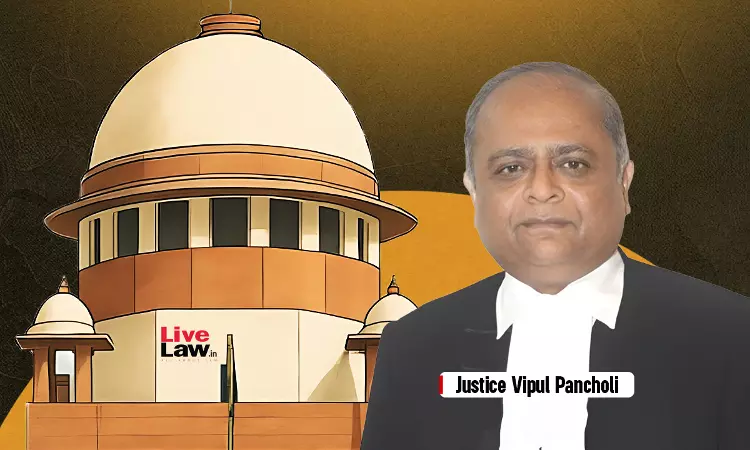- Home
- /
- Top Stories
- /
- CJAR Seeks Disclosure Of Justice...
CJAR Seeks Disclosure Of Justice Nagarathna's Dissent Against Collegium Proposal For Justice Vipul Pancholi's Elevation
Anmol Kaur Bawa
26 Aug 2025 4:36 PM IST
The Supreme Court Collegium's proposal to elevate Justice Vipul Pancholi, Chief Justice of the Patna High Court and originally from the Gujarat High Court, to the Supreme Court has sparked controversy after reports emerged that Justice BV Nagarathna dissented in the Collegium meeting.According to a report of The Hindustan Times, Justice Nagarathna had expressed reservations about...
The Supreme Court Collegium's proposal to elevate Justice Vipul Pancholi, Chief Justice of the Patna High Court and originally from the Gujarat High Court, to the Supreme Court has sparked controversy after reports emerged that Justice BV Nagarathna dissented in the Collegium meeting.
According to a report of The Hindustan Times, Justice Nagarathna had expressed reservations about Justice Pancholi's elevation when his name came under consideration of the Collegium for the first time in May this year. She had reportedly called for minutes of meetings related to Justice Pancholi's transfer from Gujarat to Patna High Court in 2023, which did not seem routine.
However, his name again came up for consideration in yesterday's collegium meeting, where the proposal to elevate him was approved with 4:1 majority, with Justice Nagarathna dissenting.
Following that, the Campaign for Judicial Accountability and Reforms (CJAR) has issued a statement, calling for the publication of Justice Nagarathna's dissent note as well as the reasons for Justice Pancholi's transfer from Gujarat HC to Patna HC in 2023.
"Justice Nagarathna opined in her dissent, that several meritorious and more senior judges had been bypassed while recommending him. She is reported to have further stated that Justice Pancholi's future CJI-ship tenure would not be in the institution's interest. The strong dissent note of Justice Nagarathna has not been published, despite her expressly asking for the same to be published on the Supreme Court's website," it said.
If the Centre approves the recommendation, Justice Pancholi will be in the line to be the Chief Justice of India from from October 2031 to May 2033 as per seniority.
The CJAR has questioned the collegium's recommendation, saying that Justice Pancholi's name was cleared despite his low seniority (57th in the all-India seniority list of High Court judges), and the fact that his elevation would make him the third judge from Gujarat on the Supreme Court Bench, a representation disproportionate to the size of the Gujarat High Court, leaving several other High Courts unrepresented.
Present Recommendation Process Not At Par With Previous Standards Of Transparency Set
Referring to the previous instance where former CJI Sanjiv Khanna made the collegium recommendations transparent by uploading the reasonings on the official website, the CJAR expressed that the same standard was hoped from the present collegium. However, the resolution statement did not furnish the reasons.
It stated, "CJAR had welcomed the disclosure by the previous Chief Justice of India, of proposals for judicial appointments approved by the Supreme Court collegium. The documents then uploaded on the Supreme Court website provided crucial details, including on the background of the candidates, whether they were related to any sitting/retired judge and the details of appointments approved by the Collegium which are pending with the government. This level of transparency had increased public faith in the collegium system to some extent. We had hoped that this level of disclosure would become the norm for every future appointment."
The CJAR pointed out 3 major concerns with respect to the way the present recommendations were made :
1. Only names of appointees are mentioned without details being given of the background of the candidates as used to be the practice
2. The collegium coram making the recommendations is missing
3. Criteria for giving preference to a certain candidate even though they are lower in seniority are not being mentioned. "
Calling this a “retrogression in transparency, most undesirable and unbecoming,” CJAR has demanded that dissent notes, minutes, and criteria for selection be disclosed in line with the Supreme Court's own precedents under the RTI Act and CVC Act. This was crucial, according to the CJAR, to "restore public faith in the process of appointments to the higher judiciary."
The statement also mentioned concerns regarding the collegium resolution of August 19, "wherein 8 advocates were recommended for elevation to the Bombay High Court, also reportedly included the name of CJI Gavai's, nephew".
Condemning the August 19 recommendations, the CJAR reiterated its stand towards upholding judicial propriety. It said:
"CJAR has repeatedly highlighted that such appointments that betray favouritism strike at the root of judicial propriety, and only full disclosures can quell the legitimate doubts that arise. It is necessary that details of the decision making process be put out in the public domain, to strengthen institutional transparency and accountability."
The CJAR has called upon the Supreme Court to :
1. Indicate the reasons for the recommendation to elevate Chief Justice Pancholi of the Patna High Court and the reason for superseding all the other judges, higher in seniority
2. Make public the reported dissent note of Justice BV Nagarathna allegedly recorded in the meeting of the collegium dated 25 August, 2025 as she has requested.
Click here to read the CJAR's statement



